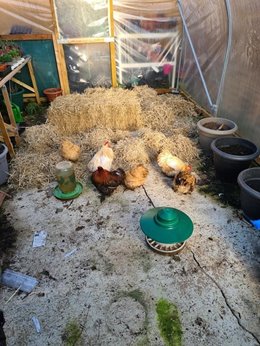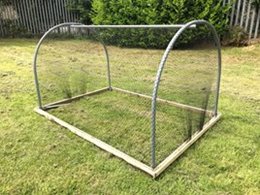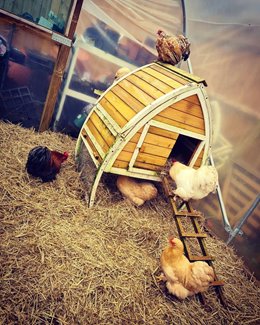Chickens are wonderful animals to house in your outdoor space. They supply you with fresh eggs, provide great fertiliser for your garden, and are often fun, friendly pets to have around.
For most of the year, raising chickens is a relatively straightforward task. But the arrival of winter marks the start of avian influenza season. Avian influenza is more commonly known as bird flu and is a seasonally occurring virus with infections normally reported between autumn and spring, increasing in winter. This time of year puts both your chicken run and, in rare cases, your own health in danger if you fail to contain it.
This is a nationwide issue and has forced the government to step in and make rule changes to prevent the spread of bird flu. If you're housing chickens, then you'll need to familiarise yourself with the new rules. To help, we've prepared an extensive guide on how you can prevent bird flu in your poultry and stay compliant with the new government rules. Read more below.
What is bird flu and how does it affect chickens?
Avian influenza is an infection that spreads amongst birds. This happens more commonly in the wild but without care or protection, can spread to domesticated birds like chickens. This is highly contagious and causes birds to grow sick or die in more severe cases. The infection tends to occur more in the UK during winter months due to the arrival of migrating birds.
This infection spreads in a bird's saliva, nasal secretions, and faeces but infected birds may also shed it onto surfaces and other birds in proximity. Over the years there have been many strains and whilst humans aren't infected by most, there have been
four varieties that have affected humans. If your chickens happen to be infected by one of these strains, then you may be able to pick up avian influenza by touching them, their bedding, or preparing and eating them. If you think you may have bird flu then you should
seek medical advice from the NHS.
For the sake of your own health and that of your chicken run, and to avoid an avian flu outbreak, be extra cautious.
What are bird flu symptoms in chickens?
We understand that chicken owners will be on the lookout for their run's health at all times but knowing how to spot diseases you're unfamiliar with may prove a challenge. There are two types of bird flu infection: low (LPAI) and high pathogenic influenza (HPAI).
LPAI is sometimes difficult to detect but there are signs that a minor infection has affected your chickens. Look out for:
- Respiratory issues
- Diarrhoea
- Loss in appetite
- 5% or more drop in egg production
HPAI on the other hand is more serious and can often result in a high mortality rate amongst your chickens. The symptoms above appear in these infections too, but other signs are a little bit easier to spot. They include:
- Swollen heads
- The blue colouration of the comb and wattles
 How to prevent bird flu outbreaks in chickens
How to prevent bird flu outbreaks in chickens
Bird flu is brought to your run from infected wild birds that infiltrate your chickens' space. These birds may spread it by drinking from your chickens' water, eating their food, or shedding the infection onto surfaces in their habitat. Therefore, keeping them out is the only way to stop an avian influenza outbreak. The following equipment may help you with that.
Polytunnel
Polytunnels are a great housing option for your chicken run and are one of the easiest ways to protect them from bird flu. This will allow your chickens to have the outdoor space they need without the threat of infected birds getting in to spread disease.
Premier Polytunnels are pleased to offer a range of sizes, so you can
find the right polytunnel for your outdoor space and the number of chickens you're housing.
 Anti-bird netting
Anti-bird netting
Other options of outdoor equipment designed to keep birds out are anti-bird netting cloches and fruit cages covered with anti-bird netting.
Anti-bird net cloches are smaller options for keeping your chickens safe from infected birds in your garden. We stock
anti-bird net cloches and each one has been designed to prevent birds from getting tangled in them. They feature a strong knitted netting, with mesh holes of 20mm, which will also stop other larger critters from invading your chicken run too.
We also stock
fruit cages in a range of sizes, which are covered with the same one-piece anti-bird net, ensuring bird keepers can remain vigilant by housing or netting their poultry when necessary.
 New bird flu restrictions that chicken owners need to know
New bird flu restrictions that chicken owners need to know
In a bid to reduce the spread of bird flu amongst poultry and other captive birds, the government is imposing mandatory housing measures for the UK as of 7th November 2022. This bird flu rule means your poultry must be housed or netted to maintain the strictest biodiversity measures.
This is in response to 88 recorded cases of HPAI in England since 1st October 2022 (as of 3rd November 2022). Other government measures that are in place include the banning of poultry gatherings like fairs, shows, and markets.
Do get in touch with the relevant bodies should you spot potential signs of bird flu in your chickens. If there's an outbreak in your chicken run, it must be reported immediately or it will be classified as an offence. In England, do this by calling the Defra Rural Services helpline on
03000 200 301 or, for Wales, call
0300 303 8268. Defra can then provide bird flu advice and tell you the next steps to combat the issue. Those in Scotland should contact your local
Field Services Office.
Keep up with the
latest updates to ensure your chicken run is safe and you aren't committing an offence.
Get in touch
Act today and purchase a polytunnel to keep your chicken run safe and remain compliant with the government's restrictions during this bird flu lockdown.
Want to find out more or have a question about
our range of polytunnels? Our dedicated team will be happy to help. Get in touch today by calling us on 01282 811250 or emailing
info@premierpolytunnels.co.uk.